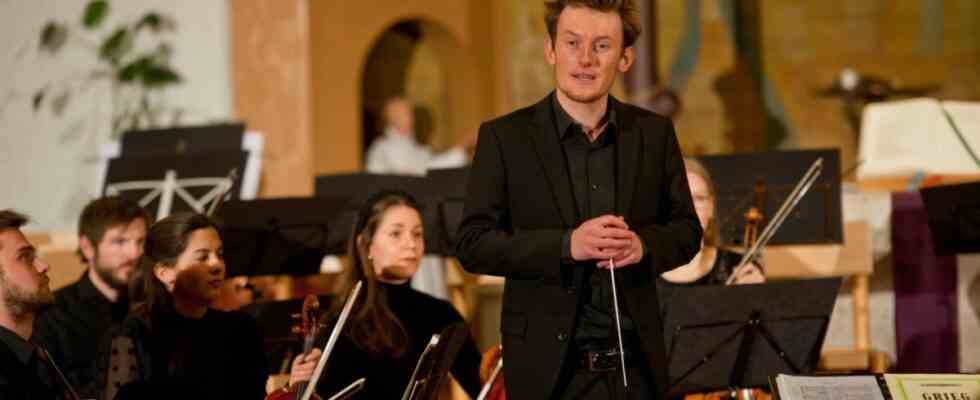One relies on soundscape composition: atmospherically floating chord clusters with minimal, very nuanced changes. The other composed a piece that is action-packed, developed an aggressive, “almost brutal” musical language that also requires unusual playing techniques. “They are two totally exciting works, and at the same time very opposite,” Maximilian Leinekugel gets enthusiastic when he describes the works of the young composers Franziska Wilhelm and Elisabeth Fußeder – two works that he performed with the Munich Classical Players on Friday in the Small Theater Haar will perform. premiere.
The two composers who come from the Munich region, Fusseder and Wilhelm, were awarded the special orchestra prize at the “Jugend komponiert Bayern” composition competition in 2019 and 2021 and, as a result of their awards, have composed two commissioned works for the Munich Classical Players, founded by Leinekugel. Wilhelm, who comes from Schondorf am Ammersee, and Fusseder, who grew up in Freising, will be present in Haar on Friday and will say a few words about their plays “Von Weitem” and “toh” (palindrome for “hot”) respectively as an introduction .
The third piece that will be heard on this “Evening of Women Composers” dates from the 19th century: the rarely performed third symphony by the composer and piano virtuoso Louise Farrenc. Born in Paris in 1804, the French woman became the first female professor at the Paris Conservatory in 1842, and awards for her compositional work followed later. Her Symphony No. 3 in G minor was a great success when it was premiered in 1849 and does not have to hide behind the orchestral works of her contemporaries, as Leinekugel emphasizes: “It has been wrongly forgotten. It is a symphony full of character, with dramatic outer movements, a wonderfully calm movement and great to play.” And of course also a contrast to the two contemporary works. Farrenc’s musical language is committed to the 19th century and breathes the spirit of Beethoven and Schubert.
The audience returns only hesitantly
This will be a demanding evening both for Leinekugel, who grew up in Vaterstetten, as conductor, and for the orchestra – which is essentially recruited from prospective professional musicians from Bavarian and Austrian music colleges (although some have already graduated). “It’s very challenging on different levels,” says Leinekugel. Born in Munich, who was awarded a Tassilo culture prize by the SZ in 2018, he is happy that after a long winter concert activity is slowly starting again – on April 30th the program will be performed again in the Schafhof in Freising. As a young conductor, the past two years of the pandemic have not always been easy for him. The fact that some audiences are hesitant to return to the concert halls does not make life easier for independent musicians.
The program that the Munich Classical Players play on the familiar stage in the Little Theater Haar is of course not nominally designed to attract the masses. But this concert is definitely something for curious ears. A certain openness towards experimental, possibly even irritating sounds and intense timbral play should be helpful. But if you dare, you will have a few acoustic experiences beyond Bach or Mozart that have never been experienced publicly before. As a listener, you are not only on the right side in terms of emancipation, but you can count yourself among the avant-garde.
Easter concert in the small theater in Haar, April 22nd, starts at 7 p.m., tickets are available https://kleinestheaterhaar.de or reserve. Another concert will take place on April 30 in the Schafhof, Freising (8 p.m.).

